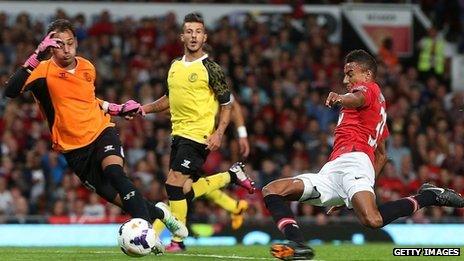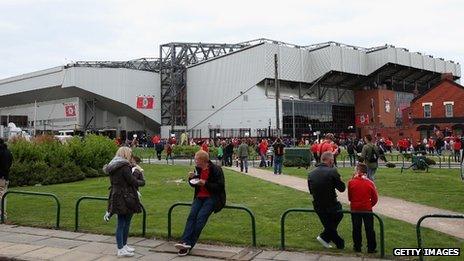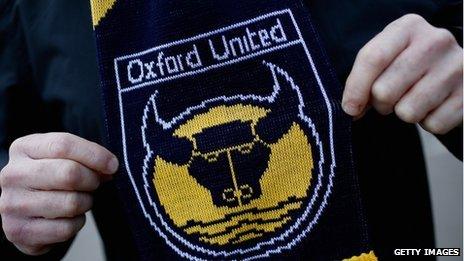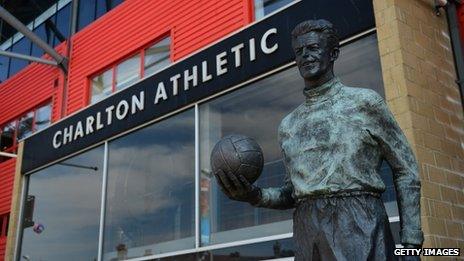Grounds for change over football stadiums
- Published

Manchester United is appealing against a decision on the status of Old Trafford
The Victorian and Edwardian merchants and entrepreneurs who founded many English football clubs might recognise something of themselves in today's billionaire overseas owners.
They would also no doubt approve of the stunning stadiums some of their successors have built on the sites where their fledgling playing combinations first established themselves.
But others among those founding fathers might be surprised to find the sites have since been turned into shopping centres or housing estates.
While many clubs - such as Arsenal - have moved voluntarily to new stadiums for modernisation or expansion reasons, others - such as Brighton - have been forced to leave their spiritual homes for pressing economic reasons.
At other clubs, the situation has become more complex over the decades - with a separation of ownership of team and stadium - leaving them vulnerable to those who might look to buy a stadium for its potential development value rather than sporting reasons.
Bad management
Now, to try to safeguard stadiums for future generations, fan organisation Supporters Direct is spearheading a campaign to have club grounds designated as Assets Of Community Value (ACV).
Under recent legislation if a stadium gets an ACV designation, and its owners later decide to sell up, they must first offer fan bodies or other community groups first chance to make an offer for the ground.

Liverpool fan group Spirit of Shankly wants to see the ground get ACV status
"There are often theories about why clubs get taken over. There is of course the intentional asset-stripping theory, whereby a dubious individual has their eye on a club, and wants to get their hands on it for the stadium value," says Supporters Direct's Kevin Rye.
"There's also the 'accidental asset-stripper' idea. They buy the club, then as so often happens in football, they get into economic difficulty, which is compounded by poor financial management of the club itself.
"Either way, often in these cases the only asset that is left is land, which could be the training ground, and eventually the club ground itself."
Supporters Direct says there have been at least 54 instances of clubs being separated from the ownership of their stadiums in the last 20 years, and that in most cases this has "not resulted in positive outcomes" for the clubs involved.
The rogue club-owner is fortunately in the minority, but fan groups say that, generally, the ACV path can bring more accountability and transparency to clubs' decisions over their stadiums.
Even if the community right to bid for the stadium is not activated, or the fan bid is ultimately rejected, they say it means that owners' actions come under public spotlight.
'Heart and soul'
Already Manchester United fans have convinced Trafford Council to label the club's Old Trafford home, where they have played since 1910, as an asset of community value.
It means a community group, probably the Manchester United Supporters' Trust (Must) - which sought the listing - would have the first right to bid for the stadium if the owners, the Glazer family, ever tried to sell up.

Oxford United's Kassam Stadium is one of a handful so far to win ACV listing
"While we appreciate the owners have no current plans to move, or sell Old Trafford, this is a decision that helps to protect fans' interests in the long term, as no one knows what the future holds," says Must chief executive Duncan Drasdo.
The club has asked Trafford Council to review its decision and says it is concerned the legislation in the Localism Act 2011, which introduced the concept of ACVs, has not been correctly applied.
United, which opposed the Must application, also says it has already demonstrated commitment to Old Trafford by investing £90m in upgrading facilities, adding that the stadium is "a special place... the heart and soul of the club".
Supporters Direct has advised more than 20 of its member fan trusts on the ACV route and there are 15 submissions under way, including league and non-league teams.
They include the Spirit of Shankly fan group at Liverpool FC, which is looking to have ACV status applied to the famous Anfield stadium, citing it as "an opportunity for us to actually have a real say in any future sale, and a protection of not only the stadium but protection of the supporters' right to be involved in the future of their club."
Exile years
So far fans at Oxford United, Nuneaton, and Barnet have also won approvals, although - as with Manchester United - the owner of Oxford United's ground is appealing against the decision to list the Kassam Stadium.
However, one club which is in favour of its own stadium becoming an asset of community value is Charlton Athletic in south-east London.

Charlton Athletic were forced to play away from The Valley from 1985 until 1992
"Every football club's stadium can be said to be important to supporters, but I think that is even more so here at Charlton," says the club's chief operating officer Steve Bradshaw.
He said the club's exile from The Valley to Crystal Palace's Selhurst Park and West Ham's Upton Park in the late 1980s and early 1990s, and subsequent battle to return home in conjunction with its fans, saw a special relationship built.
"There are no current plans to move stadium, and of course we would always give fans the opportunity to have their say in the event that such a situation arose, so the club would support proposals that would formalise this right to consultation," says Mr Bradshaw.
Charlton Athletic Supporters Trust Chairman Barnie Razzell says as well as acting as a "warning bell" should a ground be put up for sale without consultation, perhaps equally as significant ACV nominations allow football clubs and their stadiums to be formally recognised for their huge importance and value to their local communities.
Mr Razzell said he hoped politicians would continue to build on the ACV beginnings, and bring in even stronger measures to help encourage fan trusts and their participation in different forms of club ownership.